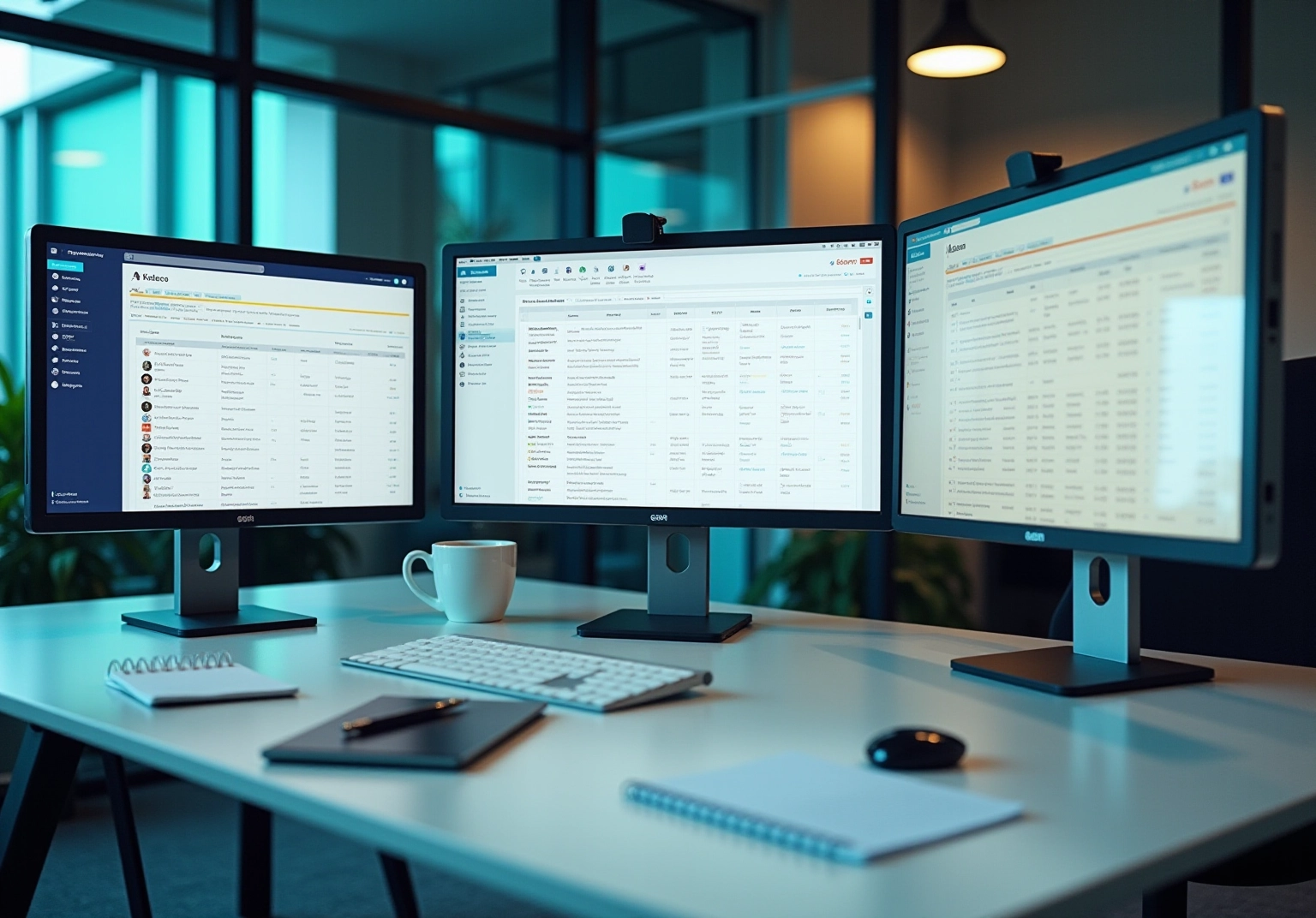Overview
This article presents a comprehensive comparative analysis of leading project management accounting software, focusing on essential features, benefits, and user experiences with platforms such as Glasscubes, Karbon, and Asana.
In the realm of accounting management, professionals often face significant challenges that hinder operational efficiency and client engagement. However, the effective integration of management and accounting functionalities can enhance these aspects dramatically.
Notably, Glasscubes distinguishes itself with its user-friendly interface and superior communication capabilities, which significantly boost client satisfaction and workflow efficiency. By adopting Glasscubes, accounting managers can expect to streamline their processes and elevate their client interactions.
The evidence is clear: utilising the right software not only addresses existing issues but also fosters a more productive environment. Therefore, for those looking to enhance their operational capabilities, exploring Glasscubes is a strategic move that promises substantial benefits.
Key Highlights:
- Project management accounting software integrates management capabilities with essential accounting functionalities for effective financial tracking and reporting.
- Key features include time tracking, expense management, invoicing, and comprehensive reporting capabilities.
- Growing adoption of such software in the UK reflects a shift towards enhanced operational efficiency and financial transparency.
- Essential criteria for evaluating software include integration capabilities, user interface, reporting tools, scalability, cost, customer support, and security compliance.
- Glasscubes stands out for its user-friendly interface, real-time reporting, and strong customer engagement features, significantly improving communication with clients.
- Karbon is recognised for its task management and collaboration features tailored for financial firms, while Asana offers flexibility through integrations but may lack accounting-specific functions.
- Glasscubes enhances client engagement through automated reminders, streamlined communication, and real-time project monitoring, making it a valuable tool for accountants.
Introduction
In the ever-evolving landscape of project management, the integration of accounting functionalities stands as a pivotal advancement for organisations seeking enhanced financial oversight and operational efficiency. Project management accounting software emerges as a formidable solution, seamlessly blending essential project management capabilities with powerful financial tracking features. This dual functionality empowers firms to effectively manage budgets and monitor expenses, while simultaneously elevating client satisfaction through heightened transparency.
As the adoption of these integrated solutions accelerates, comprehending their key features and benefits becomes essential for businesses aiming to refine their financial management practises. From intuitive user interfaces to comprehensive reporting capabilities, this article explores the core elements of project management accounting software, equipping firms with the knowledge to select the right tools that will drive their success.
Understanding Project Management Accounting Software
Project management accounting software integrates management capabilities with essential accounting functionalities, delivering a powerful solution for financial tracking and reporting. These tools empower organisations to effectively manage budgets, track expenses diligently, and ensure initiatives remain within financial constraints using project management accounting software. Key features of project management accounting software typically include:
- Time tracking
- Expense management
- Invoicing
- Comprehensive reporting capabilities
All of which are vital for maintaining financial oversight throughout the lifecycle.
Recent statistics indicate a growing adoption of management software in the UK, reflecting a shift towards integrated solutions that enhance operational efficiency. By consolidating these functionalities, firms can significantly elevate client satisfaction through improved financial transparency and accountability provided by project management accounting software. For instance, specialised project management accounting software that includes tracking and budget oversight features has proven to enhance effective cash flow management, ultimately supporting the overall financial health of project-focused businesses.
Industry insights underscore the importance of merging financial management with project management accounting software and task coordination tools, as this synergy not only streamlines processes but also strengthens financial supervision. Real-world examples reveal that organisations leveraging project management accounting software experience enhanced financial tracking and reporting, which leads to improved decision-making and outcomes. As the landscape of project management accounting software evolves, the emphasis on user-friendly interfaces and automated features becomes increasingly critical for firms striving to optimise their financial management practises.
Key Comparison Criteria for Accounting Software
When evaluating project management accounting software, essential key criteria emerge for making an informed decision.
- Integration Capabilities: Seamless integration with existing systems, such as CRM and ERP, is vital for ensuring efficient data flow and minimising errors. A study indicates that firms leveraging integrated software solutions experience a significant reduction in operational costs and errors.
- User Interface and Experience: A user-friendly interface is crucial for reducing the learning curve and enhancing staff adoption rates. Software that prioritises intuitive design can lead to higher satisfaction ratings among users, fostering a more productive work environment.
- Reporting and Analytics: Robust reporting tools that provide real-time insights into initiative performance and financial health are indispensable. Effective analytics abilities enable financial teams to make data-informed choices, ultimately enhancing results with the use of project management accounting software. The company provides real-time reporting capabilities that improve insight into task status and advancement, which is becoming increasingly crucial in the accounting sector.
- Scalability: The software must be capable of growing alongside the organisation, accommodating increasing project complexity and volume. Scalable solutions ensure that firms can adapt to changing demands without incurring significant additional costs.
- Cost: A clear understanding of the pricing structure, including potential hidden fees, is essential for effective budgeting. Transparent pricing models help firms avoid unexpected expenses and ensure they receive value for their investment. The company offers a straightforward pricing model that enables firms to budget effectively.
- Customer Support: Reliable customer support is critical for resolving issues swiftly and effectively. Firms that prioritise customer service often report higher satisfaction levels and improved operational efficiency. The company offers dedicated customer success managers to help users maximise the value of their software.
- Security and Compliance: Ensuring compliance with relevant regulations, such as GDPR, and implementing robust security features is non-negotiable. The company exemplifies this with its GDPR-compliant user portal, which enhances data security while streamlining information gathering. Additionally, the automated communication features of the platform facilitate timely interactions with clients, further enhancing engagement and efficiency.
By concentrating on these criteria, financial managers can choose software solutions that not only satisfy their current requirements but also prepare their firms for future expansion and achievement.

Comparative Analysis of Leading Project Management Accounting Solutions
In this comparative analysis, we delve into three prominent project management accounting software solutions: Glasscubes, Karbon, and Asana.
Glasscubes stands out with its intuitive interface and exceptional user engagement features. This platform automatises reminders and delivers real-time reporting, making it particularly advantageous for accountants aiming to enhance communication with clients and significantly reduce response times. With an impressive customer support rating of 4.8, Glasscubes demonstrates a strong commitment to user satisfaction. Notably, users like Sophie Montgomery from TaxAssist Accountants have reported saving an astounding 288 hours in just one tax season, underscoring the platform’s efficiency. Moreover, Glasscubes complies with GDPR regulations, ensuring data privacy, while offering features such as an open API, digital file approval, and a client portal, which further enhance its utility for financial firms utilising project management accounting software.
Karbon offers robust project management accounting software specifically designed for financial firms. Its strengths lie in task management and collaboration features, making it an ideal choice for teams that prioritise effective communication and task oversight. While specific user satisfaction ratings are not highlighted, Karbon is recognised for its comprehensive approach to project management accounting software in managing financial workflows.
Asana, primarily a project management tool, integrates seamlessly with various project management accounting software, providing a flexible solution for teams that require adaptability in project management. However, it may lack certain accounting-specific functionalities without additional integrations. Asana boasts a Value for Money rating of 4.6, Functionality at 4.5, and Ease of Use at 4.8, although it does not provide a rating for Customer Support.
Comparison Summary:
- User Experience: Glasscubes leads with its intuitive design, while Karbon and Asana present more complex interfaces.
- Customer Engagement: Glasscubes excels in communication features, significantly enhancing response rates and overall interaction, as evidenced by user testimonials emphasising improved transparency and quicker replies.
- Integration: Asana offers the greatest flexibility with third-party integrations, while Karbon and other platforms emphasise accounting-specific functionalities.
In the competitive landscape of project management accounting software, Glasscubes excels in enhancing customer interaction and streamlining communication, positioning itself as an invaluable resource for accountants striving for efficiency and effectiveness in their processes.

Why Choose Glasscubes: Enhancing Client Engagement and Efficiency
Glasscubes distinguishes itself in the project management accounting software landscape by enhancing customer engagement and operational efficiency. This powerful project management accounting software effectively addresses common challenges faced by accounting managers, making it an indispensable tool for modern practices. Key benefits include:
- Automated Reminders: Accountants can send an unlimited number of reminders on customizable schedules, drastically reducing the time spent on client follow-ups. Tailoring messages for urgency ensures critical deadlines are met, allowing professionals to concentrate on strategic tasks.
- Streamlined Communication: Users report that clients upload information more swiftly than through email, thanks to the clarity offered by Glasscubes. Clients can log in to view outstanding requests, which fosters engagement and minimizes the need for constant follow-ups.
- Real-Time Reporting: Accountants can monitor customer requests and project statuses in real-time, enhancing transparency and accountability across the board.
- User-Friendly Interface: The platform requires no extensive training, making it accessible for all team members—an essential feature in today’s fast-paced financial environment.
- GDPR Compliance: Glasscubes ensures that all user data is handled securely, addressing compliance concerns that are paramount in the accounting industry.
- Proven Results: Testimonials from users highlight significant time savings and improved customer response rates, underscoring the tool’s value for firms looking to enhance their engagement strategies. For example, audit managers have noted that the software has transformed their processes, facilitating smoother workflows and improved interactions with clients.
With these features, Glasscubes not only streamlines accounting workflows but also significantly boosts client engagement, establishing itself as a crucial project management accounting software for contemporary accounting practices.
Conclusion
The integration of project management accounting software represents a pivotal advancement in financial oversight and operational efficiency. By combining essential project management capabilities with robust accounting functionalities, these tools empower organisations to manage budgets effectively, monitor expenses, and enhance client satisfaction through increased transparency. Key features such as time tracking, expense management, and comprehensive reporting are vital for maintaining financial oversight throughout the project lifecycle.
When evaluating project management accounting software, organisations must consider critical criteria, including:
- Integration capabilities
- User experience
- Reporting tools
- Scalability
- Cost
- Customer support
- Security compliance
Focusing on these aspects enables firms to select solutions that not only meet their current needs but also position them for future growth and success. The comparative analysis of leading solutions, particularly Glasscubes, underscores the significance of user-friendly interfaces and features that facilitate efficient client engagement and streamlined communication.
Ultimately, the right project management accounting software can transform how organisations approach financial management and project oversight. By leveraging integrated solutions, businesses can achieve enhanced operational efficiency, better decision-making, and improved project outcomes. As the landscape continues to evolve, investing in the right tools becomes essential for firms aiming to thrive in a competitive environment. Embracing these advancements will pave the way for greater financial health and long-term client satisfaction.
